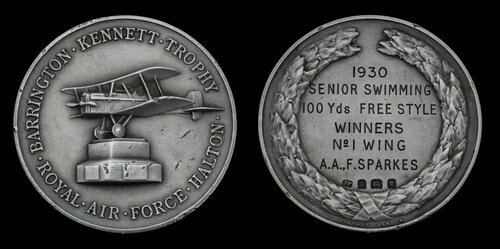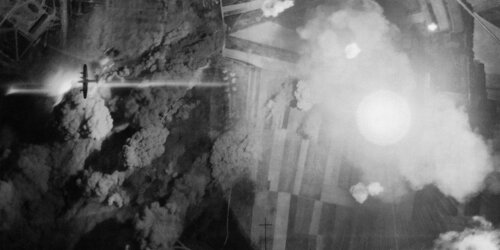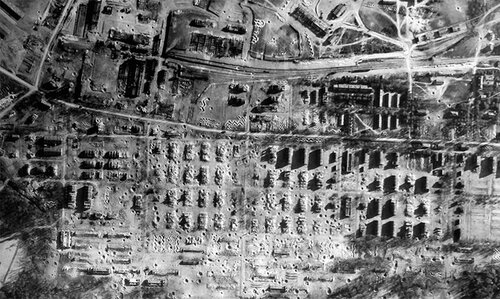Auction: 21003 - Orders, Decorations and Medals
Lot: 590
Barrington-Kennett Medal, 1st type (1930 Senior Swimming 100 Yds Free Style Winners No1 Wing A. A. F. Sparkes [SIC]), hallmarks for London 1930, by John Pinches, note initials and incorrect spelling of surname, contact marks, edge bruising, nearly very fine
[D.F.C.] London Gazette 25 January 1946.
[A.F.C.] London Gazette 1 January 1952.
Ernest Neville Monkhouse Sparks was born on 17 February 1912 the son of Francis George Monkhouse and Mable Alice Irving Sparks. Joining Halton as an Apprentice with the 17th Entry in January 1928, he served with 1 Wing with the number '562314', taking part in the 1930 Barrington-Kennett competition as a swimmer. His medal was named to 'A. A. F. Sparkes' however there was no apprentice with that initial with No 1 Wing. Moreover a photograph of the No 1 Wing's 1930 swimming team lists him as F.N.M. Sparks, suggesting a loose approach to naming at the time. He passed out of Halton with the rank of Aircraftman Class I to No.3 Flying Training School, Grantham. Retraining to fly here Sparks left with the rank of Sergeant (Pilot) and was transferred to 70 (BT) Squadron at Risalpur during their involvement in Waziristan Campaign on 25 May-14 September 1937 before it relocated to Dhibban on 16 October.
Commissioned Pilot Officer on 1 April 1940 Sparkes was soon promoted Flying Officer on 1 April 1941. Having been advanced Flight Lieutenant on 1 April 1942 he joined No. 83 Squadron on 1 December 1943, flying Lancaster bombers. After serving briefly with the crew of Squadron Leader Johnson a diversionary attack over Mannheim on 20 December Sparks was soon given command of his own aircraft. His maiden flight as crew commander was in the Berlin raid of 29 December, the attack however caused little damage for heavy losses. However the raids continued and they were ordered to Berlin again on 1 January 1944, despite having only been with the squadron for a month Sparks was given the honour of leading them off. This raid proved even more disastrous than the first, especially for 83 Squadron who lost Wing Commander Abercromby in the attack.
By the time of the Mailly-Le-Camp raid in May 1944 Sparks was a Squadron Leader serving as Deputy Controller for the mission under the overall command of Wing Commander Deane. The target for the raid was the Panzer Training Centre at Mailly-Le-Camp, the intention was to mark the targets with Mosquitos led by Group Captain Cheshire while the Deane would command the bombers. The first part of the plan went ahead smoothly, with red marker flares dropped neatly in place to guide the bombing force to its destination, Cheshire accordingly radioed Deane to order the first wave of bombers in. This however was where things unravelled, Deane was having radio difficulties and was not only hardly able to hear Cheshire but could hardly broadcast to the rest of the Group. After a wait of several minutes the Group began its attack although whether this was due to somebody managing to receive an order from Deane or simply frustration at what proved a deadly delay is unclear. To make matters worse by some terrible chance the US Armed Services Radio was broadcasting Big Band music on the same RT frequency as the British Aircraft. In this confused situation Sparks had to take over, unable to contact Deane or hear his orders and uncertain if he was even still in the air and he ordered the attack to begin. At this stage however it was hard to get orders through to the other aircraft as pilots were calling out recriminations and requests for orders, accompanied by occasional musical interludes, it is uncertain how many heard him. A bigger difficulty was getting the pilots to stop their bombing runs to in order to clear the way for the Marker's second run, in this Sparks was only partly successful. Nevertheless the second run went ahead and the order to attack came through to the second wave of bombers:
'Rat Two, bomb. Come on, all you insolent bastards, everybody - bomb'
The waiting pilots though the voice to be that of Cheshire but in fact it was Sparks. The casualties to the British force were appalling with 42 Lancaster's shot down, the damage of the German facility however was practically levelled. Sparks remained at his position above Mailley-le-Camp until the very end of the raid when his Lancaster (JB402 OL-R) was shot down by a night fighter. They crashed around 15 km north of Montmirail, Marne, but survived with five of his crew and succeeded in evading capture thanks to the aid of the French Resistance. He returned to duty on 1 August 1944 and was leading sorties only a few days later as the Squadron repeatedly targeted St-Leu d’Esserent. When a follow up raid was proposed on Königsberg after the previous one only days before had failed to produce sufficient results, Sparks was one of the officers called upon to act as a visual marker. However he fell victim to the heavy flack, being last heard from at 01:37 while over the target but failing to reappear after the raid. It was soon learned that he had again been shot down, this time with only four of his crew surviving, but had been unable to evade on this occasion and was taken prisoner of war on the morning of 29 August. Though his name appears of the rolls of Imperial prisoners of war there is no camp or prisoner number associated with them, he does however also appear on the roll of Stalag Luft I. Remaining in the Air Force after the war Sparks was promoted Wing Commander on 1 July 1947 and appointed Officer Commanding RAF Section, Upper Heyford in 1950. He retired on 31 October 1956; sold together with RAF Halton lists, a copied photograph of the No.1 Wing 1930 swimming team and a copied entry in Bomber Command Losses 1944.
Subject to 20% VAT on Buyer’s Premium. For more information please view Terms and Conditions for Buyers.
Estimate
£80 to £100
Starting price
£60









